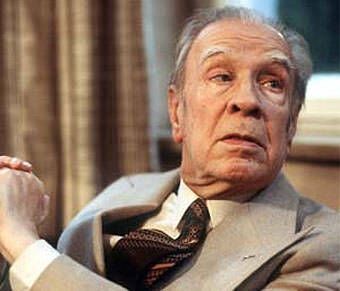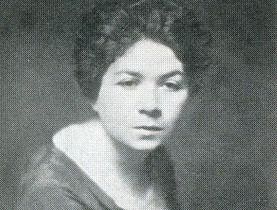

Jorge Luis Borges
Jorge Luis Borges (1899-1986) is one of the great literary heroes of Argentina. Born in Argentina, Borges spent several years in Europe as a child and was educated in English as well as Spanish. As an adult he returned to Argentina to write and work as a professor of English. Artistically rebellious, Borges wrote poems and stories which are imaginative and often puzzling, many of themvehicles for complex philosophical themes. His 1944 collection of short stories, Ficciones, is widely regarded as his masterwork. Prolific and smart as all get-out, Borges also wrote alle gories, fantasies and even detective stories.
For more information: https://en.wikipedia.org/wiki/Jorge_Luis_Borges
Juan Lopez and John Ward
Borges wrote “Juan Lopez and John Ward, during the Malvinas/Falklands conflict in 1982
It was their luck to be born into a strange time.
The planet had been parceled out among various countries, each
one provided with loyalties, cherished memories, with a past
undoubtedly heroic, with rights, with wrongs, with a particular
mythology, with bronze forefathers, with anniversaries, with
demagogues and symbols.
This arbitrary division was favorable for wars.
Lopez was born in the city beside the tawny river; Ward, on the
outskirts of the city where Father Brown walked. He had
studied Spanish in order to read Quijote.
The other one professed a love for Conrad, who had been revealed
to him in a classroom on Viamonte Street.
They might have been friends, but they saw each other face to
face only once, on some overly famous islands, and each one of
them was Cain, and each was Abel.
They were buried together. Snow and corruption know them.
The incident I mention occurred in a time that we cannot understand.
Alfonsina Storni: Sleep Peacefully
Alfonsina Storni was born on May 29, 1892, in Switzerland. In 1896, the Storni family moved to Argentina and settled in the province of San Juan where her father had a brewery. Four years later, the family moved to Rosario city where Alfonsina was forced to abandon her studies and get a job to help her parents.
Some time went by until the theater company of Manuel Cordero arrived in Rosario and Alfonsina got a job as an actress and traveled around the country. She later decided to become rural teacher and got a teaching job in a school as dramatic arts teacher.
During this time she had an affair with a married man of the political world, with whom she had a son, at the age of 19. Since then, she divided her time writing poems and teaching at the Labardén Municipal Infant Theater and in the National Conservatoire, where she worked until the last days of her life. She managed to publish poems in "Caras y Caretas", a leading illustrated magazine of political satire, scientific and social news that included a few literary collaborations; and received awards and honors for them.
In 1916, she began to give public speeches and to got involved in the literary circles after her book "La Inquietud del Rosal" was published. Her principal poetical works are: "El dulce daño", "Irremediablemente", "Languidez", "Ocre", "Poemas de Amor", "El amo del mundo", "Dos farsas pirotécnicas", "Mundo de siete pozos" and "Mascarilla y trébol". She also collaborated with major magazines and newspapers from Buenos Aires.
In 1920 she won the First Municipal Prize of Poetry and the Second National Prize of Literature. Alfonsina participated in the creation of the Argentine Society of Writers' and her involvement in the literary movement was very intense. In 1928 she traveled to Spain with actress Blanca de la Vega where she met other women writers and where the poet Concha Méndez dedicated her some of her poems.
In 1935 Alfonsina had to be operated to remove a tumor, but the cancer spread and she would go through deep deppressions; and to worsen her situation, two of her fiends, writers Horacio Quiroga and Leopoldo Lugones, comitted suicide.
In October of 1938 she traveled to Mar del Plata from where she sent two letters; one to her 26 year old son and a farewell poem to the "La Nación" newspaper. She survived a cancer, but a problems of the heart drove her to commit suicide at the age of 46. Her last poem is called: "Quiero Dormir" (I want to sleep). Her biographers assure that she jumped to the water from the seashore in Mar del Plata, Buenos Aires province.
Alfonsina Storni was one of the most important Argentine poets of the century and was poetical and spiritual myth that slowly submerge in the sea. In the proximities of the site where the writer Alfonsina Storni took her life on October 25, 1938, there is a commemorative monument, designed by the sculptor Luis Perlotti in 1942.
For more information: https://allpoetry.com/Alfonsina-Storni
Sleep Peacefully
You said the word that enamors
My hearing. You already forgot. Good.
Sleep peacefully. Your face should
Be serene and beautiful at all hours.
When the seductive mouth enchants
It should be fresh, your speech pleasant;
For your office as lover it's not good
That many tears come from your face.
More glorious destinies reclaim you
That were brought, between the black wells
Of the dark circles beneath your eyes,
the seer in pain.
The bottom, summit of the beautiful victims!
The foolish spade of some barbarous king
Did more harm to the world and your statue.
← Go back Next page →
